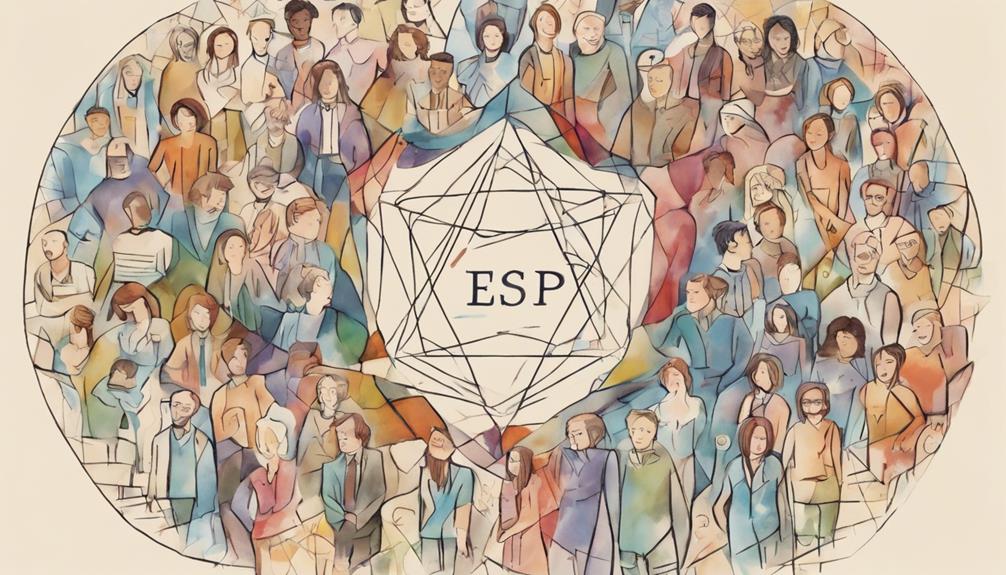When looking at Enneagram types that ESFJs are commonly associated with, there is often a strong connection to Type 2. This preference for Type 2 can help us understand the complex dynamics of ESFJs’ relationships and motivations.
However, as we delve deeper into the complexities of ESFJ personalities, we might uncover surprising nuances that challenge this apparent prevalence.
Key Takeaways
- ESFJs are predominantly Enneagram Type 2 with a 3 wing, emphasizing sociability and helping others.
- Type 6 influence on ESFJs leads to practicality and seeking support in relationships.
- ESFJ Enneagram 1 traits include perfectionism, high standards, and a quest for harmony.
- ESFJs with Enneagram 3 traits are driven by success, goal-oriented, and skilled in communication.
Enneagram Type 2 and ESFJs
Enneagram Type 2 pairs significantly well with ESFJs due to their shared focus on extroverted feeling, with a predominant 47-61% of ESFJs identifying with this type. Within this group, 81% have a 3 wing, emphasizing achievement and success, while the remaining 19% have a 1 wing, highlighting a sense of perfectionism and responsibility.
Type 2 ESFJs are known to be sociable, helpful, and deeply invested in the well-being of others. They thrive on providing support, seeking validation, and fostering connections with those around them. ESFJs with Enneagram Type 2 traits prioritize relationships that fulfill their need for love, appreciation, and a sense of belonging.
Their supportive nature shines through in their interactions, where they go above and beyond to ensure the emotional needs of their loved ones are met. This combination of extroverted feeling and the inherent traits of Type 2 creates individuals who are nurturing, empathetic, and dedicated to fostering harmonious relationships.
The Influence of Enneagram Type 6

Pivoting from the discussion of Enneagram Type 2 and ESFJs, the influence of Enneagram Type 6 on ESFJs reveals a distinct perspective characterized by a blend of dedication, social engagement, and a practical approach to relationships. Type 6 ESFJs, comprising 67% with a 5 wing and 33% with a 7 wing, are deeply engaged individuals who highly value personal connections and seek support in their endeavors and relationships. Motivated by the need for guidance and reassurance, they oscillate between feelings of helplessness and empowerment through the support they receive. These ESFJs are known for their social nature, chattiness, trustworthiness, and a practical outlook on life. Below is a table highlighting key characteristics of ESFJs with Enneagram Type 6:
| Aspect | Description |
|---|---|
| Social Behavior | Highly social, engaging, and chatty, forming strong personal connections. |
| Trustworthiness | Reliable and trustworthy, they seek support and guidance in their relationships. |
| Practicality | Approach life with a practical mindset, focusing on tangible solutions. |
| Support Seeking | Motivated by the need for support and reassurance in their endeavors. |
ESFJ Enneagram 1 Traits
Striving for perfection and embodying a strong sense of morality and justice, ESFJ Enneagram 1 individuals are known for their dedication and hard work ethic. These personalities set high standards for themselves and others, driven by a desire to uphold what they believe is right and just.
ESFJ Enneagram 1 types are self-disciplined and thrive in structured environments where rules are clear. They excel in roles where they can make a positive impact on others, using their organizational skills to create harmony and order.
While their commitment to excellence is admirable, ESFJ Enneagram 1 individuals may struggle with being overly critical of themselves and others, leading to stress and tension. Learning to balance their pursuit of perfection with self-compassion is important for their personal growth.
Exploring ESFJ Enneagram 3 Characteristics

Driven by a relentless pursuit of success and a deep-seated need for validation, ESFJ Enneagram 3 individuals exhibit a compelling blend of ambition and adaptability in their approach to life. When delving into the characteristics of ESFJs with Enneagram 3, several key traits emerge:
- Competitive Nature: ESFJ Enneagram 3 types are inherently competitive, constantly striving to outperform others and be recognized for their achievements.
- Fear of Failure: Despite their outward confidence, these individuals harbor a deep fear of failure, especially in personal aspects of their lives, which fuels their drive for success.
- Inventive and People-Oriented: ESFJs with Enneagram 3 aren't only goal-oriented but also innovative in their approaches, often leveraging their strong communication skills to navigate social situations and build relationships effectively.
In essence, ESFJ Enneagram 3 personalities embody a unique combination of ambition, competitiveness, and adaptability, making them formidable forces in pursuing their goals while seeking validation from those around them.
Understanding ESFJ Enneagram 9 Relationships
ESFJ Enneagram 3 individuals, known for their competitive nature and fear of failure, transition smoothly into fostering harmonious relationships as Enneagram 9 types.
ESFJ Enneagram Type 9 individuals prioritize harmony in their relationships, aiming to create a peaceful environment for those around them. They excel as natural mediators, often putting aside their own weaknesses to maintain harmony within their social circles. However, their strong focus on harmony can sometimes lead to indecision, especially when faced with choices that may disrupt the peace they strive to uphold.
In relationships, extroverted ESFJ Type 9s are typically warm and welcoming, creating a friendly atmosphere for others to thrive in. Nonetheless, their deep dedication to ensuring harmony for everyone can pose challenges in addressing their own needs and desires. Balancing the needs of others with their personal aspirations can be a significant area of growth for ESFJ Enneagram 9 individuals as they navigate the complexities of relationships.
Frequently Asked Questions
What Is an ESFJ Type 3 Enneagram?
We are ESFJ Type 3 Enneagrams. We embody drive, ambition, and competitiveness. Struggling with others' success and failure acceptance is common. Action-oriented, strong communicators, and people-oriented, we focus on personal growth. Identity loss is feared.
What Is the Most Similar Type to Esfj?
In understanding ESFJs, we recognize their similarities to ENFJs and ISFJs due to their dominant Fe function. ESFJs can exhibit traits of both types, showcasing warmth, dedication, and empathy based on their Enneagram type.
Can ESFJ Be Enneagram 1?
Yes, ESFJs can be Enneagram Type 1 individuals. They exhibit traits of being organized, principled, and having high standards. While less common, they strive for perfection and are dedicated to promoting peace and helping others.
What Personality Type Is Esfj?
We are ESFJs, known for our warmth and social nature. We often gravitate towards Enneagram Type 2, seeking affirmation and valuing relationships. This alignment offers insights into our desire to help and support others.
Conclusion
In conclusion, the Enneagram Type 2 is the most common among ESFJs, highlighting their nurturing and supportive nature.
However, the presence of Type 6 shows the diversity within this personality group.
As we reflect on this, it becomes clear that 'birds of a feather flock together,' as ESFJs are drawn to types that align with their values and behaviors, fostering understanding and harmony in their relationships.









